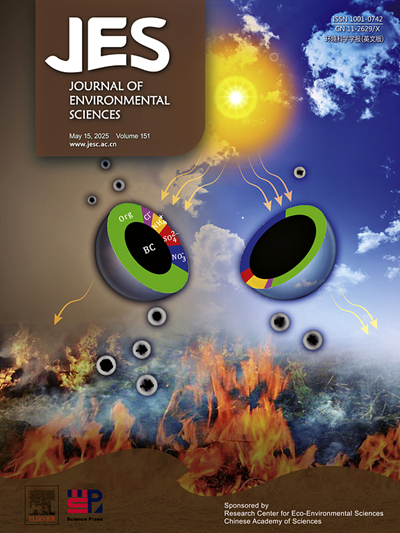Microbial inoculants modify the functions of soil microbes to optimize plant growth at abandoned mine sites
IF 5.9
2区 环境科学与生态学
Q1 ENVIRONMENTAL SCIENCES
引用次数: 0
Abstract
Mining activities have caused significant land degradation globally, emphasizing the need for effective restoration. Microbial inoculants offer a promising solution for sustainable remediation by enhancing soil nutrients, enzyme activities, and microbial communities to support plant growth. However, the mechanisms by which inoculants influence soil microbes and their relationship with plant growth require further investigation. Metagenomic sequencing was employed for this study, based on a one-year greenhouse experiment, to elucidate the effects of Bacillus thuringiensis NL-11 on the microbial functions of abandoned mine soils. Our findings revealed that the application of microbial inoculants significantly enhanced the soil total carbon (TC), total sulfur (TS), organic carbon (SOC), available phosphorus (AP), ammonium (NH4+), urease, arylsulfatase, phosphatase, β-1,4-glucosidase (BG), β-1,4-N-acetylglucosaminidase (NAG). Moreover, this led to substantial improvements in plant height, as well as aboveground and belowground biomass. Microbial inoculants impacted functional gene structures without altering diversity. The normalized abundance of genes related to the degradation of carbon and nitrogen, methane metabolism, and nitrogen fixation were observed to increase, as well as the functional genes related to phosphorus cycling. Significant correlations were found between nutrient cycling gene abundance and plant biomass. Partial Least Squares Path Model analysis showed that microbial inoculants not only directly influenced plant biomass but also indirectly affected the plant biomass through C cycle modifications. This study highlights the role of microbial inoculants in promoting plant growth and soil restoration by improving soil properties and enhancing normalized abundance of nutrient cycling gene, making them essential for the recovery of abandoned mine sites.

微生物接种剂可以改变土壤微生物的功能,以优化废弃矿区的植物生长
采矿活动在全球造成了严重的土地退化,强调需要进行有效的恢复。微生物接种剂通过提高土壤养分、酶活性和微生物群落来支持植物生长,为可持续修复提供了一个有前途的解决方案。然而,接种剂影响土壤微生物的机制及其与植物生长的关系需要进一步研究。本研究采用宏基因组测序方法,在为期一年的温室试验基础上,研究了苏云金芽孢杆菌NL-11对废弃矿山土壤微生物功能的影响。结果表明,施用微生物菌剂显著提高了土壤总碳(TC)、总硫(TS)、有机碳(SOC)、速效磷(AP)、铵(NH4+)、脲酶、芳香磺化酶、磷酸酶、β-1,4-葡萄糖苷酶(BG)、β-1,4- n -乙酰氨基葡萄糖苷酶(NAG)的含量。此外,这导致了植物高度以及地上和地下生物量的实质性改善。微生物接种剂影响功能基因结构,但不改变多样性。与碳氮降解、甲烷代谢和固氮相关的基因以及与磷循环相关的功能基因的归一化丰度均有所增加。养分循环基因丰度与植物生物量呈显著相关。偏最小二乘路径模型分析表明,微生物接种剂不仅可以直接影响植物生物量,还可以通过C循环修饰间接影响植物生物量。本研究强调了微生物接种剂通过改善土壤性质和提高养分循环基因的标准化丰度来促进植物生长和土壤恢复的作用,这对废弃地的恢复至关重要。
本文章由计算机程序翻译,如有差异,请以英文原文为准。
求助全文
约1分钟内获得全文
求助全文
来源期刊

Journal of Environmental Sciences-china
环境科学-环境科学
CiteScore
13.70
自引率
0.00%
发文量
6354
审稿时长
2.6 months
期刊介绍:
The Journal of Environmental Sciences is an international journal started in 1989. The journal is devoted to publish original, peer-reviewed research papers on main aspects of environmental sciences, such as environmental chemistry, environmental biology, ecology, geosciences and environmental physics. Appropriate subjects include basic and applied research on atmospheric, terrestrial and aquatic environments, pollution control and abatement technology, conservation of natural resources, environmental health and toxicology. Announcements of international environmental science meetings and other recent information are also included.
 求助内容:
求助内容: 应助结果提醒方式:
应助结果提醒方式:


